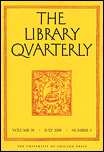The Library Quarterly
 | |
| Discipline | Library science |
|---|---|
| Language | English |
| Edited by | Paul T. Jaeger and Natalie Greene Taylor, with Jane Garner and Shannon M. Oltmann |
| Publication details | |
| History | 1931–present |
| Publisher | University of Chicago Press (United States) |
| Frequency | Quarterly |
| 0.558[1] (2016) | |
| Standard abbreviations | |
| ISO 4 | Libr. Q. |
| Indexing | |
| CODEN | LIBQAS |
| ISSN | 0024-2519 |
| JSTOR | 00242519 |
| OCLC no. | 01755858 |
| Links | |
The Library Quarterly is a quarterly double-anonymous peer-reviewed academic journal covering library science, including historical, sociological, statistical, bibliographical, managerial, psychological, and educational aspects of the field. It is published by the University of Chicago and was established to fill a need for investigation and discussion set forth by the American Library Association in 1926.[2] The editors are Paul T. Jaeger (University of Maryland, College Park), and Natalie Greene Taylor (University of South Florida), with associate editors Jane Garner (Charles Sturt University, Australia) and Shannon M. Oltmann (University of Kentucky).[3]
History[]
The Library Quarterly was established in January 1931, the year that Lee Pierce Butler joined the University of Chicago Graduate Library School, which was where library science as the academic study of the relationship between books and users was originally conceived. Thus, its publication history parallels the existence of library science as a field of academic research. The emergence of a journal devoted expressly to research in library science was met with conflict in the discipline according to the journal's first editor, . The controversy revolved around whether research and scientific method was needed in the field.[2] The Quarterly continued publication after the Graduate Library School closed in 1989.
was managing editor from 1961 through 1972, in 1975, from 1980 through 1985 and from 1988 through 1989. More than 50 of his essays (particularly those on 16th-century printers' devices) appeared in The Library Quarterly.[4]
Until 2013, the covers of the journal featured emblems from booksellers or printers. Featured in every issue was a study of the particular emblem that focuses on the typographer, dealer, seller, and designer. As of 1975, 176 prints had been displayed on the journal's cover.[5] The University of Florida libraries provide digital access to printers' devices, including those that appeared on the cover of The Library Quarterly.[6]
In 2004 The Library Quarterly went online, adding additional articles, content, and unique supplements. Online features also include most accessed and most cited articles.[7]
References[]
- ^ "Journal Citation Reports". Clarivate Analytics. Retrieved 2017-12-14.
- ^ a b Norman, Steve (October 1988). "The Library Quarterly in the 1930s: A Journal of Discussion's of Early Years". The Library Quarterly. 58 (4): 327–351. doi:10.1086/602047. JSTOR 4308292. S2CID 147248390.
- ^ "The Library Quarterly".
- ^ "Obituary: Howard Winger, Graduate Library School". University of Chicago Chronicle. 14 (13). March 9, 1995. Retrieved 2013-03-22.
- ^ Sharpe, John L. III (January 1978). "An Index to Printers' Marks in The Library Quarterly". The Library Quarterly. 48 (1): 40–59. doi:10.1086/629994. JSTOR 4306898. S2CID 147588501.
- ^ "Printer's Devices". University of Florida George A. Smathers Libraries. Retrieved 2013-07-16.
- ^ Bertot, John Carlo; Wiegand, Wayne A. (April 2004). "The Library Quarterly Goes Online". The Library Quarterly. 74 (2): 97–98. doi:10.1086/421726. JSTOR 10.1086/421726. S2CID 144625598.
External links[]
- Quarterly journals
- Library science journals
- University of Chicago Press academic journals
- English-language journals
- Publications established in 1931
- 1931 establishments in Illinois